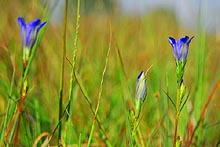The Health Benefits of Gentian

The gentians are an extensive group of plants, numbering about 180 species, distributed throughout all climates, though mostly in temperate regions and high mountains, being rare in the Arctic.
The name of the genus is derived from Gentius, an ancient King of Illyria (180-167 B.C.), who, according to Pliny and Dioscorides, discovered the medicinal value of these plants. During the Middle Ages, gentians were commonly employed as an antidote to poison. Tragus, in 1552, mentions it as a means of diluting wounds.
In Africa gentians are used against malaria, in South America against snakebites, in Europe and Asia as digestives, and in Southeast Asia one species is harvested for its rot-resistant timber. Gentians are also included in perfumes, weight-loss products, skin care products, and homeopathic remedies.
The most commonly gentian used in Europe is Gentiana lutea, the Yellow Gentian. The root of Gentiana lutea is available as a powdered herb in capsule or tablet form, in liquid tinctures, and as a bulk herb for making tea. You can find the root extract as an ingredient of many commercial digestion-promoting products.
The roots contain pure bitter compounds so intense that you can still taste the bitter at a dilution of 1 drop of the tincture in 20,000 parts water. Because the root doesn't contain tannins or other digestive irritants, it's recommended for daily use and can be taken for years. The herb is prescribed for weak digestion, poor appetite, anaemia, and if you're recovering from an illness.
|